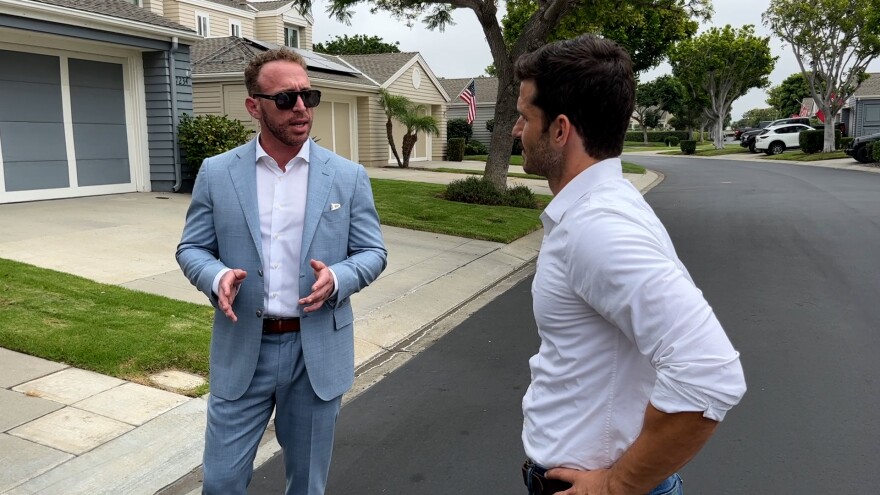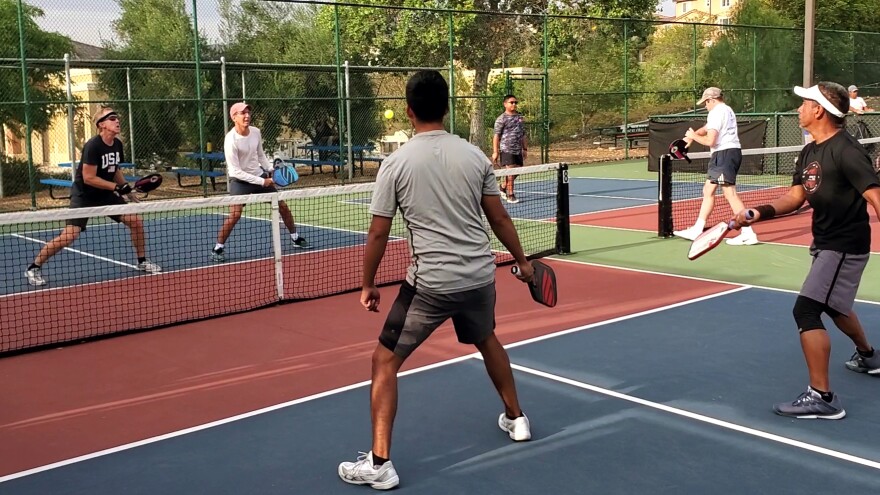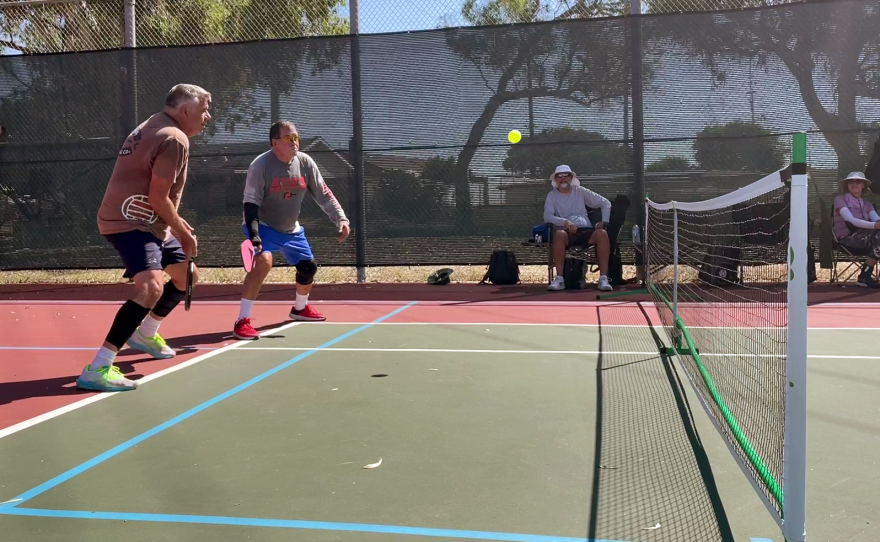Jaye Gleyzal moved to the Sea Cliff gated community in Carlsbad six years ago.
She enjoyed exploring its many walking paths and listening to the gentle buzz of busy hummingbirds on her patio.
But that idyllic tranquility didn’t last.
“Two years ago, they started pickleball,” she said with an exhausted laugh. “Oh my God, it changed my life overnight.”
Even if you haven’t played pickleball, you’ve probably heard about it from a fanatical uncle or roommate who says you’ve just got to try it. The game is similar to tennis, but it’s played with paddles and a hard plastic ball.
The Sea Cliff Homeowners Association painted pickleball lines on one of the community tennis courts, which is about 60 feet from Gleyzal’s bedroom window.
The sound — “POP, POP, POP,” as she describes it — is a nuisance that’s frayed her last nerve. Unlike tennis, where players rally a fuzzy ball across an 80-foot court, pickleball involves rapid-fire points exchanged at the net.
“It can be up to eight hours a day, seven days a week,” she said.
Pickleball is the fastest growing sport in America. According to many who live near courts, it’s also one of the loudest. People in the San Diego region and across the country are increasingly taking legal action to resolve pickleball noise disputes. There’s now a cottage industry of attorneys and consultants ready to jump in, and in some cases, pickleball has been banned outright in specific locations.
After Gleyzal wrestled with the Sea Cliff HOA for years, and after mediation didn’t yield an acceptable compromise, she took the HOA to court.
She recognizes a lawsuit is an extreme step — one she didn’t anticipate at the dispute’s outset — but she argues the sound is more than just an annoyance. Gleyzal works from home in the evenings and tries to sleep during the day, but the endless pop-pop-ing often keeps her awake. If games are still going by the time she starts work, Gleyzal has to wear noise canceling headphones to focus. On days off, she’ll often leave the house to escape the din.

She claims the noise has even started affecting her health.
“I would get these splitting headaches,” she said. “And then, my blood pressure started going up, and this was the only consistent irritation in my life.”
Her lawsuit aims to ban pickleball from the community tennis courts and seeks $300,000 in damages for the distress she’s experienced.
A representative for the homeowners association declined an interview request, and no players were on the court to offer comment on the day KPBS visited the community. That’s a rare occurrence, according to Gleyzal.
Bring in the lawyers and consultants
Nicholas Caplin didn’t plan on specializing in pickleball disputes when he decided to go to law school.
“I thought I was going to be a big corporate transactional lawyer sealing mergers and acquisitions,” he said.
Turns out, poring over contracts wasn’t Caplin’s thing. He liked advocating for clients, and real estate law was the perfect venue for him. His rise in the field — he’s now a partner at the law firm Lubin Pham + Caplin — happened to coincide with the exploding popularity, and attendant frustrations, of pickleball.
“I'm glad to be doing what I'm doing, but I certainly didn't envision it when I graduated law school,” he said with a smirk.
While pickleball may be fun and games for players, it’s serious business for Caplin. At a recent afternoon meeting with his client Gleyzal, he showed up sporting a powder blue suit, pocket square and Persol designer sunglasses. His attire and jet-black Cadillac combine to exude big lawyer energy.

Caplin said his firm has handled more than 25 cases related to pickleball disputes.
“From Sacramento down to Chula Vista … Orange County, Los Angeles County, San Francisco County — I could go on and on,” he said.
Some of his clients have taken on homeowners associations, while others challenged cities and counties that allowed pickleball in public parks near their homes.
Some cases go to court, according to Caplin, but most are settled through mediation or arbitration.
“We have obtained outright bans on pickleball, we've obtained money damages,” he said. “In certain circumstances, homeowners are amenable to (sound) mitigation measures.”
Caplin insists he has nothing against the sport. It gets people active and is accessible for players of all ages, especially older generations. All good things, in his opinion.
“But what I do believe is that it shouldn't infringe on somebody else's rights,” he said.
Assessing sound and annoyance can be subjective, so homeowners often seek out acoustical engineering professionals to get a scientific measure of the noise produced by nearby pickleball courts.
Lance Willis is among the top engineers in this small but burgeoning niche of acoustics consulting. His Tucson-based firm, Spendiarian & Willis Acoustics & Noise Control, has handled about 80 pickleball noise consultations since 2010.
Some consultations are tied to legal disputes, while others are commissioned by cities and counties where pickleball is a contentious issue. One recent assessment of pickleball noise for the city of Centennial, Colorado totalled nearly 80 pages.
“It's really a matter of finding that balance between people doing the things that they want to do, but also not overly impacting the people around them,” Willis said.
He explained that pickleball noise can be irritating for neighbors because of its “impulsive” nature. In lay terms, that means it’s a sharp sound that can pierce even high levels of ambient noise.

That’s why it’s so hard to mitigate the sound of a pickleball court after it’s been built, he said, and one reason why converting tennis courts for pickleball use stirs up controversy over noise. Not to mention, it also causes friction between the two sports. In San Diego, a heated turf war between tennis and pickleball players over court space even led to the police being dispatched.
Typical sound-masking techniques, like having a court next to a busy roadway, are not very effective for pickleball. Sound barriers like walls or fence covers can help, but their impact is limited. There’s also a push to develop balls and paddles that produce less noise, but Willis’s research has found the equipment doesn’t make a big difference.
The best way to mitigate the sound of a pickleball court, according to Willis, is to start thinking about noise abatement before the court is constructed. The firm’s research suggests noise mitigation measures — such as lowering the courts several feet into the ground and constructing sound barriers — are needed for most courts within 350 feet of homes. Extensive sound mitigation is often required for homes within 150 feet, and the firm discourages courts within 100 feet of residences.
Willis cautioned that pickleball noise can tear neighborhoods apart.
“It is kind of sad to watch in some situations, because I have seen it divide communities right down the middle,” he said. “And it's something that we would like to avoid happening if we could.”
Finding common ground
At Gershwin Park in San Diego, a group of pickleball players are trying to find common ground with neighbors to avoid that kind of division.
On a recent Tuesday morning, more than a dozen players gathered on the park’s tennis court, which has been divided into four pickleball courts. Folding canvas chairs lined the fence, where players taking a break cheered and kibitzed their fellow picklers.

Bob Schaible, a retired school teacher, has lived in the neighborhood for more than two decades and plays pickleball here most mornings. But he acknowledges the sport is a source of tension.
“We try to be as respectful as possible,” Schaible said. “Beyond that, I don't know that there's an easy solution.”
In recent weeks and months, some frustrated neighbors have filed noise complaints with the city’s Parks and Recreation Department. For now, the city gives priority to pickleball in the morning and then tennis later in the day — though it’s unclear if that will placate homeowners within earshot.

Anna Wolf, another longtime resident in the neighborhood who plays at Gershwin Park, said her group abides by the hours established by the city. She also tells fellow players to park on the side of the street adjacent to the park, in order to minimize congestion near houses.
But she acknowledges the tensions may persist, because she and other players don’t plan on relocating.
“Pickleball is just growing every day,” she said. “I love enjoying our park. It's great to see everyone out and playing and enjoying themselves.”
Schaible said the long-term answer may be found in embracing the sport’s exploding popularity.
“As the city develops more public courts … it will lessen the impact on individual neighborhoods like this one,” he said.
He argues more places to serve, slice and dink means spreading out the noise, and hopefully keeping pickleball on the playing courts — and out of the court of law.





